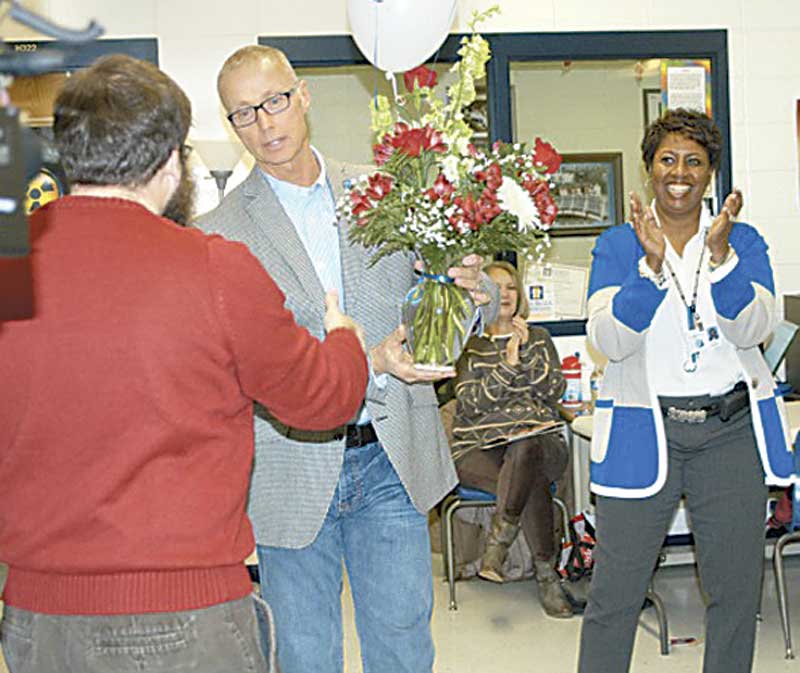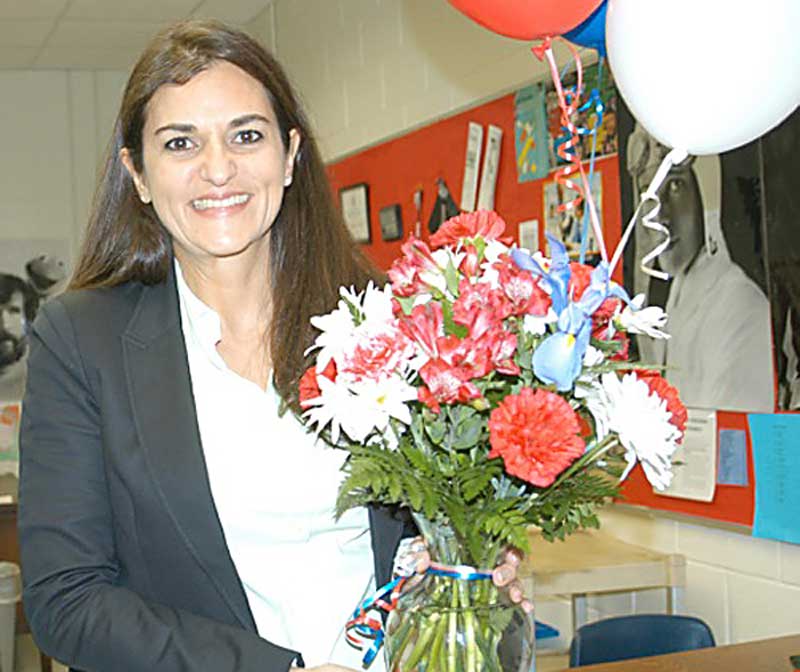It is a “first” for the Fayette County Teacher of the Year program: all three finalists teach elective subjects: drama, music, and business/computer science.
This year’s finalists are David Spearman, drama, Starr’s Mill High; Kelly Jackson, music, Crabapple Lane Elementary; and Alexandra Vlachakis, business/computer science, Sandy Creek High.
The finalists were chosen from among the 26 school-level teachers of the year who submitted an essay-style application for consideration in the competition. The judging panel of two retired Fayette County teachers and last year’s teacher of the year, Chasity Manning of Fayette County High, individually scored each application based on the quality and content of the answers. The three candidates with the highest average scores become the finalists.
The next level of competition will involve classroom visits and interviews with the judges. The finalist with the highest average score will win the title of Fayette County Teacher of the Year. The winner will be announced at the annual teacher of the year ceremony scheduled for April 24 at New Hope Baptist Church, South Campus. The program starts at 6 p.m., and is free and open to the public.
At right, better than an apple for the teacher — Fayette County Board of Education Vice-Chair Dr. Bob Todd (R) congratulates a surprised Dr. Kelly Jackson, music teacher at Crabapple Lane Elementary School in Peachtree City, for being named a finalist for teacher of the year. Photo/Fayette County School System.
Kelly Jackson, music teacher at Crabapple Lane Elementary, grew up with parents who were educators, and both influenced the teacher she is today. Her mother, a kindergarten paraprofessional, taught Jackson to lead with compassion and to take on any challenge that presents itself for the good of the school. Her father, a college history professor, demonstrated going above and beyond the ordinary to give his subject meaning and relevance.
“I strive for the same, going above and beyond in order to pass my passion for music to future generations as I teach,” said Jackson.
She says teaching at the elementary level gives her opportunities to witness the “eureka” moments of young learners.
“Though these moments may be as small as the kindergarten student who realized that the music we are moving to has a pattern, her utterance opens the door to discussing musical form, and gives her a connecting thread between what she is learning in the classroom and what she learns in the music room.”
Jackson also enjoys the unexpected effect that music activities have on her autistic students. She talks about a recent instance involving a second grade student who is normally non-verbal and non-participatory. He demonstrated that if given an instrument or pair of mallets, he is able to play the same music as his classmates.
“I featured this class and young boy at our holiday assembly. He smiled as he played the glockenspiel, holding the mallets exactly as I had shown him,” she said
“This is one of my greatest contributions to the field of education, that I can facilitate such ‘I can do this!’ moments for the children, that they may see the music room not as its own entity, but as a viable extension of their learning and their lives.”
David Spearman, drama teacher at Starr’s Mill High, grew up in a small South Carolina town that lived and breathed football. That made it difficult for Spearman being that his interests were not in football, but rather theatre. His high school did not offer a theatre class, and the once-a-year drama production was dependent on a teacher volunteering to do it.
 At left, David Spearman (C) receives a bouquet in recognition of his finalist selection. Photo/Fayette County School System.
At left, David Spearman (C) receives a bouquet in recognition of his finalist selection. Photo/Fayette County School System.
“My senior year, none of the teachers were willing to volunteer time to produce a show. I was devastated. It was the one thing that gave me a place to belong. I decided then that I would be a high school drama teacher so students like me would not face that same devastation, and could find a safe haven in their schools,” said Spearman.
When he became the drama teacher at Starr’ Mill in 2000, he inherited a struggling program with a production budget of only $134. He worked hard to turn the drama program around and now the school sells out shows. The production budget has grown to over $30,000, and the school’s newly formed booster club has an operating budget of over $20,000.
As a drama teacher, Spearman spends countless hours after school and on weekends working with students and their parents as they rehearse and prepare for shows. He quickly points out that the drama department’s success is not due to any one thing he has done, but gives the credit to everyone involved (teacher, students and parents) working as a team.
“I approach the classroom and all productions with a ‘team’ attitude. I believe it is essential to remain student focused and let the students and parents have ownership in the educational process,” said Spearman.
He says the greatest reward in teaching is not found in instant gratification, but rather down the road when former students contact him about how his class made a positive difference in their lives.
“They often explain that by participating in a show or taking my class, they gained a self-confidence or a sense of pride that they had never known. We may not see it every day, but we [teachers] do make a difference,” said Spearman.
Alexandra Vlachakis, business and computer teacher at Sandy Creek High, remembers wanting to become a teacher at the tender age of eight while still living in El Salvador. She enjoyed playing “school” with her friends and siblings, and always said that she wanted to be a teacher when asked what she would like to be when she grew up.
At right, Alexandra Vlachakis is all smiles with her bouquet. Photo/Fayette County School System.
is all smiles with her bouquet. Photo/Fayette County School System.
She lost sight of her dream of becoming a teacher when her family was forced to seek asylum in the United States in 1978 during El Salvador’s 12-year war. The transition was not easy. Her father, who had been an engineer in El Salvador, could not find steady work in the states, and her family struggled to make ends meet. Vlachakis had to work several full-time jobs to help her family financially and pay for college.
Her financial struggles at such a young age are engrained in her memory, enabling her to empathize with the hardships some of her students face.
“I go out of my way to help them in any way I can. Just before the semester break a student of mine came with tears in her eyes because she couldn’t afford stamps for her college applications. I wanted to cry with her since I remember those stressful days when I couldn’t pay for my college fees. Without hesitation, I bought her some stamps and together we mailed her applications,” said Vlachakis.
Since becoming a teacher, Vlachakis has stayed busy, both in and out of the classroom. She has spent countless hours serving on advisory committees to create new career clusters for students, as well as technology workshops for teachers. However, her main focus is on the students in her classroom, making sure they have the support they need to succeed.
“I always felt alone in my education, trying to help my parents and myself figure out how to survive and succeed in the United States. I do my best to see to it that students in my classroom feel comfortable to seek access to resources and support whatever they might need, and when the system doesn’t provide the support, sometimes I do.”












Leave a Comment
You must be logged in to post a comment.